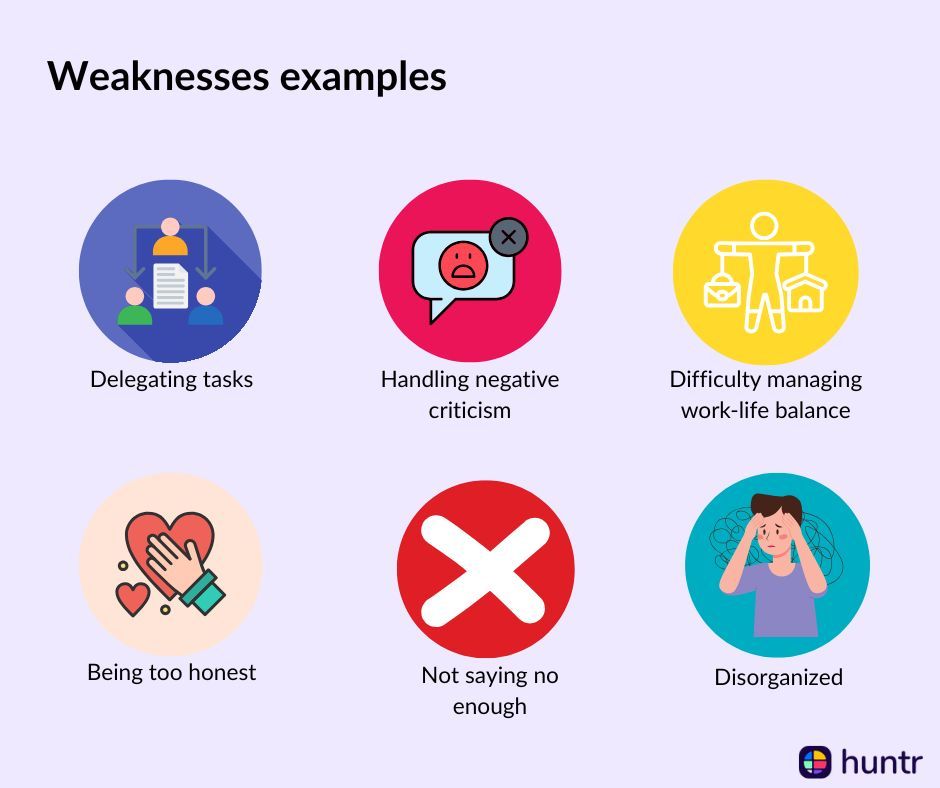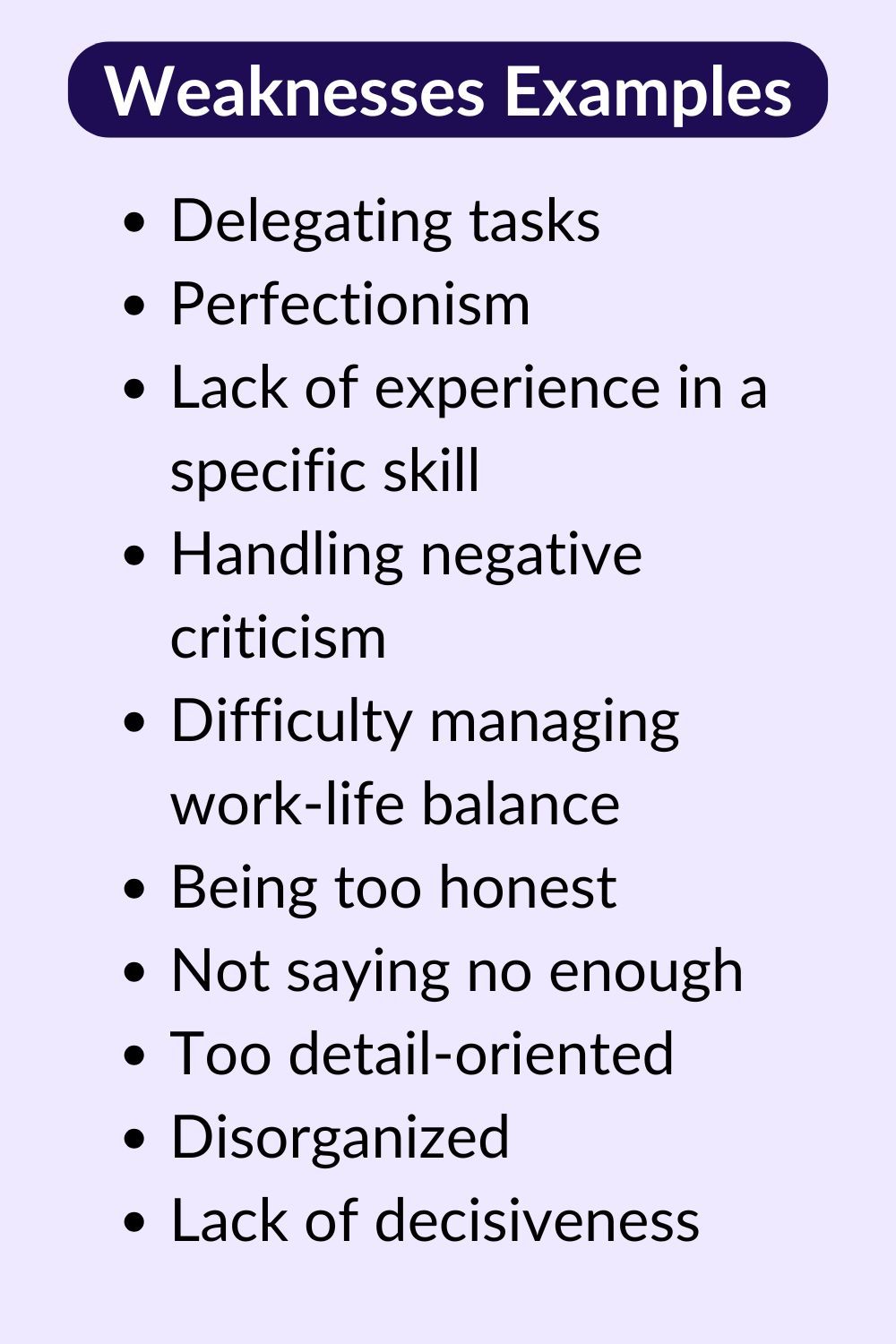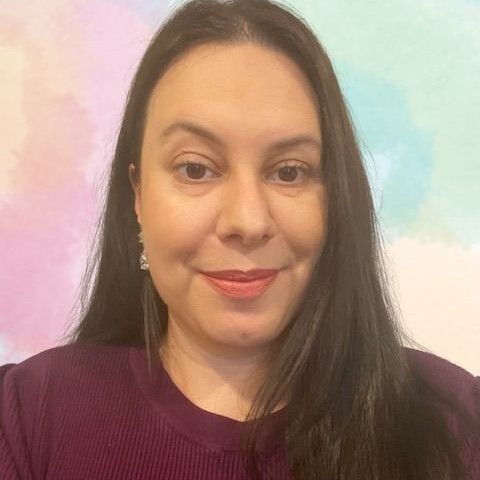Huntr Blog
10 Weaknesses Examples to Share in an Interview (With Stories)
January 09, 2024
Nobody likes talking about the things they’re bad at. Yet, sharing weaknesses examples in an interview shows a few great things: your honesty, your willingness to improve yourself, and your ability to self-reflect. Recruiters aren’t really trying to weed you out with this question, they’re most likely at how you deal with weaknesses. It’s about understanding your mindset when it comes to negative feedback and self-improvement. We’re going to share some weaknesses examples that are safe for sharing in an interview and how to position it to your potential new employer.
Getting ready for a big interview?
Sign up for Huntr to access mock interview questions and answers (and more!)
10 Weaknesses Examples to Share in an Interview
1. Delegating tasks
Typically, those in leadership positions will be more likely to share this as a weakness. The goal of sharing this weakness example is to show that you’re not going to micromanage your team, you’re working on or have recently worked on improving this weakness, and you can overcome this challenge.
“For most of my career, I was a roll up your sleeves kind of person. I had so much fun doing the work because I’m so passionate about [field]. However, as a new leader, I’ve struggled with delegating tasks to team members so that I can prioritize higher impact tasks like improving and refining the overall strategy to hit targets. I’ve spent the past few months reading books on this topic, asked a few other leaders how they dealt with it, and have started practicing delegating tasks in my previous role, so I’ve seen some improvement already. But I’m still working on it.”
2. Perfectionism
When it comes to sharing weaknesses examples like perfectionism, it will sound a bit cliche. Avoid using this example unless it’s actually true for you as it’s one of the most overused weakness examples used in an interview setting. In most businesses, speed to market is valued over perfectionism. You might’ve also heard the expression, “good is better than perfect.” Highlighting one of these expressions can tie in nicely with your overall messaging.
“As a developer, I try my best to write really tight code. I might be a bit of a perfectionist in how I write code and the time I spend to ensure that there’s no bugs or issues with the code I write. In the past, I spent too much time working on something to perfection, which allowed competitors to creep up quickly. I’ve begun using the philosophy “good is better than perfect” to write code efficiently so that we can launch new products and features faster. I went from launching (number) of features per year to (higher number). The result of my impact was an increase in (customers, revenue, features, etc) for the business.
3. Lack of experience in a specific skill in the job description
You can be perfectly qualified for a role but missing some experience that’s listed in a job description and still get hired. If you want to use a specific weakness example that ties in your lack of experience in a specific area that the employer is looking for, you can highlight how you teach yourself new skills fast.
“I’ve been working in marketing for over 10 years, so I’ve played around a lot with various tactics and methods. In your job description, you mentioned you wanted someone who had experience in managing a LinkedIn account. I’ve personally never used LinkedIn professionally so this would be my biggest weakness in the role. However, I’ve worked in algorithmic platforms in the past, such as through search traffic and other social media platforms like Twitter. My approach to mastering LinkedIn would be through a method I use to learn new skills: experimentation. Even if I was a whiz at LinkedIn, when joining a new company I always start by trying different methods to see what an audience responds best with. This experimentation style has led to some of my biggest marketing wins of all time, such as (share example). I would use this strategy to help me level up my skills fast while gaining insights into what your audience responds well with.
4. Handling negative criticism
Most recruiters in an interview setting will ask you to deal with feedback. If they don’t ask this question to you during the interview, you might use it as a weakness if you’ve had trouble with negative feedback in the past. People who struggle with criticism are typically those with fixed mindsets. So, when answering this question, you want to highlight how you have a growth mindset.
“In my past performance review, I was given feedback that I negatively overreact to constructive criticism. Deep down, I knew it was true. My manager asked me to read a book by Carol Dweck called Mindset to help me overcome this situation. And the book gave me a really good way of managing it. I basically learned to take criticism as a way to improve myself and get better. After reading the book, I actually started scheduling meetings with people on my team to ask for more feedback, then I got to work and made changes to habits, traits, and flaws. Within three months, I had four different coworkers tell me that they could see a difference in how I handle feedback.”

5. Difficulty managing work-life balance
When sharing weaknesses examples, such as struggling to manage work-life balance, you don’t want to overshare what your home life is while also being honest about your work ethic. You probably don’t want to talk about being a parent in an interview because some recruiters might discriminate against that, even if it shouldn’t happen. It’s about showcasing how you can improve your balance.
“In the past, I’ve struggled with work-life balance. I understand with seniority comes more responsibility so I check work notifications even when done for the day or off for the weekend. To prevent burnout, I block off time on the weekend for relaxation where I don’t check notifications to ensure I have energy on Monday. But I’ll still be responsive on weekends at set times in case an emergency arises since I’m managing an international team. I’ve also told employees working evening or weekend shifts to use their best judgment when a crisis at work happens in case I don’t see their notification in a timely manner when I’m offline.”
6. Being too honest
There are two types of communication styles people use: direct and indirect. Both have their advantages and disadvantages. But you’re more likely to notice when someone has a direct communication style as it can have a bit of a shock jock factor to it. Being direct or “too honest” can still be valuable in the workplace, it’s about showing that you put in effort to consider your delivery.
“I grew up in a family where honesty and direct communication was the main communication style. However, I’ve fairly quickly learned that not everyone communicates the same way. Occasionally, I’ll still have slip ups, but overall I’ve been working on this by learning how to be more tactful through communication books and courses, choosing to have difficult conversations on video calls instead of in Slack, and choosing direct honesty only when it really matters instead of in every interaction.”
7. Not saying no enough
Have you ever been the person everyone delegates their tasks to? Fortunately, you can use this experience as your weakness example in an interview. It’s a delicate balance of showing you’re a team player but also responsible enough to say no to low priority tasks that aren’t in your wheelhouse.
“In my previous role, my team members had so much trust in my work. I was often the go-to person for the team to get support on things with. When someone didn’t know how to use a tool, they’d ask me to do the work for them. But I would become overburdened by my lack of saying no. I wanted to prove that I was a team player, while taking some of these additional responsibilities off my plate. Whenever I learn how to use a new tool, I now record Loom videos that I can share with team members to help others become more autonomous while allowing me to focus on high priority tasks. It’s how I learned how to say no without leaving my team without support.”
8. Too detail oriented
People hoping to transition from crafter roles to leadership roles will typically use this weakness when showcasing their challenges with transitioning into a new role with a very different skill set. When you’re a crafter, you’ll need to be deep in the details, when you transition into leadership you zoom out into strategy.
“As a product designer, being attentive to detail has served me well throughout my career. It’s allowed me to create many beautiful designs that are user-friendly, functional, and well-designed. Transitioning into my first leadership role has required a shift in thinking for me to transition from being zoomed into the details into being more zoomed out to look at the big picture. I’m obsessed with reading books, and this year I’ve set a challenge to read one leadership book each month to help me transition my thinking from being too detail oriented to focusing more on a broader strategy.”
9. Disorganized
While you never want to tell an interviewer that you’re a wildly disorganized person, it’s normal to mention that you struggle with organization skills. You might share a story about how being disorganized creates a problem and how you ended up resolving the situation to ensure you overcome weaknesses examples regarding organization.
“When I transitioned into a product manager role for the first time, I hadn’t anticipated a need for organization. I used to chat with the developer about what he was working on, but there were no clear processes in place. And after nothing was being shipped, my boss pulled me aside, and I realized my organization skills could use some work. I created a post on LinkedIn asking to do coffee chats with other product managers who are interested in sharing pearls of advice. And realized most of them work in sprints. So, I took the initiative to create sprints at the company to ensure new initiatives, such as features or products were being shipped constantly and within set timelines.”
10. Lack of decisiveness
In some positions, being decisive is important to ensure things keep going, progress is made, and you can move on to doing the work of that decision. When telling a recruiter about this weakness example, you’ll want to showcase your process for making decisions.
“As a leader, I like to give my team autonomy to make decisions when it comes to work. Since they have the context in their roles, the decision-making comes naturally to them. However, recently, I realized that it was actually my indecisiveness that was holding the team back. I asked for feedback from the team as I typically do regarding our new annual targets and no one agreed. There was no consensus at all. I knew whatever would be decided would hurt feelings and egos. But I stepped aside to say that I would make the final decision using everyone’s input and that it was important for the entire team to align with the targets even if they weren’t happy with what was chosen. And I thought through every perspective shared and made the decision within the hour.”
What’s your weakness in the job search?
Having weaknesses is normal. Striving to overcome them can allow you to be the best version of yourself. If you’re currently doing interviews and are finding yourself to be a bit disorganized, you can use a tool like Huntr to organize your job search, track all applications and interviews, and store all application documents and offer details. If you’re currently job searching, doing interviews, and hoping to land an offer fast, sign-up for Huntr today.

Get More Interviews, Faster
Huntr streamlines your job search. Instantly craft tailored resumes and cover letters, fill out application forms with a single click, effortlessly keep your job hunt organized, and much more...
AI Resume Builder
Beautiful, perfectly job-tailored resumes designed to make you stand out, built 10x faster with the power of AI.
Next-Generation Job Tailored Resumes
Huntr provides the most advanced job <> resume matching system in the world. Helping you match not only keywords, but responsibilities and qualifications from a job, into your resume.
Job Keyword Extractor + Resume AI Integration
Huntr extracts keywords from job descriptions and helps you integrate them into your resume using the power of AI.
Application Autofill
Save hours of mindless form filling. Use our chrome extension to fill application forms with a single click.
Job Tracker
Move beyond basic, bare-bones job trackers. Elevate your search with Huntr's all-in-one, feature-rich management platform.
AI Cover Letters
Perfectly tailored cover letters, in seconds! Our cover letter generator blends your unique background with the job's specific requirements, resulting in unique, standout cover letters.
Resume Checker
Huntr checks your resume for spelling, length, impactful use of metrics, repetition and more, ensuring your resume gets noticed by employers.
Gorgeous Resume Templates
Stand out with one of 7 designer-grade templates. Whether you're a creative spirit or a corporate professional, our range of templates caters to every career aspiration.
Personal Job Search CRM
The ultimate companion for managing your professional job-search contacts and organizing your job search outreach.

